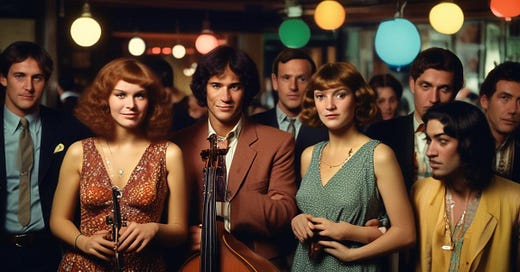When last we considered why Music & Culture, I pointed to Tom Stoppard’s play, Travesties, and its narrator’s line about artists having “a chit for life” (a get-out-of-jail free pass).
I also drew attention to the bad behavior we commonly associate with artists, and how Edit Piaf, as depicted in La Vie En Rose, defends her shrewish behavior to a maid by protesting, “What’s the point of being Edith Piaf then?” She must be indulged in light of her talents.
Are artists really privileged characters? Do they have a “chit for life”?
Strangely enough, people commonly assume so, and they aren’t wrong, although artists are as subject to the same standards of right and wrong as anyone else. Their privileges are of another sort, and, if anything, bring with them their own obligations.
For most of my life, I have earned my living as a writer. When I meet a new person, he often asks what I do: “I’m a writer.”
The new person invariably looks at me with a heightened curiosity, often shadowed by suspicion and occasionally by embarrassment.
“Are you someone I should know?”
Most often I use William F. Buckley’s line, which was not true of him but dead-on accurate in my case: “No, I’m just a working stiff.”
On rare occasions I meet someone who does know my work. People like this often react with excitement, as if the top of my head were about to open and fireworks shoot out.
It’s awful. I don’t cut much of a figure, and I know I’m going to disappoint them.
I’ve known writers who could instantly adopt personas that people who admired their work found satisfying; ways of fitting themselves into the world that verified their exalted status in the eyes of their fans.
The late Madeleine L’Engle, author of the young adult classic, A Wrinkle in Time, could wrap an exquisitely woven shawl around her shoulders and play the grand dame to the hilt. Another friend who has passed, Larry Woiwode, author of Beyond the Bedroom Wall (if you don’t know that title and his others, you should), had a way of wearing a black leather jacket over a black shirt, a bollo tie, and pressed blue jeans that declared his standing. He came off as such a distinguished Western gentleman that he could wear whatever the hell he wanted on any occasion, with a lingering whiff of James Dean rebellion. N. Scott Momaday, in his Native American regality, took the most gushing plaudits as simply his due. The avant-garde novelist, John Hawkes, often acted as such a creature of his literary imagination as to be wholly out-of-touch with staples of the American scene like football. His mind was as other-worldly as an avant-garde artist’s should be or so he liked to pretend.
In these and many other ways, the writers I have known, as well as the painters and musicians, have found ways to verify in their fans’ imaginations that they are people of a different order.
Of course, the best of them, like Larry Woiwode, played the part when needed to guard his privacy and then let it go.
Since my pate doesn’t retract to shoot off Roman candles, my only recourse is to redirect the conversation and engage the person about what he does for a living. In this way, I’ve found out what it means to be everything from an FBI field officer to a manufacturer of fertilizer. Manufacturing fertilizer is actually quite interesting.
The immediate reaction of people hearing they are meeting one type of artist or another says several things about why artists and their audiences have a particular need to understand a vocation to the arts. Let’s unravel them.
Right away, there are threshold considerations, questions as to authenticity. Are you a real writer (painter, musician, actor, etc.) Or are you only a “wannabe” or “never-was”? How much consideration are you actually due here? What are your bona fides before I grant legitimacy to your standing as an artist?
Are you really someone I should know?
If you are the genuine article, then…what?
Oh, then, please make a gesture of obeisance (a humble nod of recognition or an autograph request will do) and pledge undying allegiance.
I’m kidding, but I mean, what are people imagining? And what is this all about anyway?
It all comes from this notion of artists being “privileged characters.” What are these privileges, though, if they aren’t an excuse for bad behavior?
Popular music, TV shoes, movies, social media videos, novels for adults and stories for children—the arts play an incredible role in our lives. We remember the music that was popular during certain periods and speak of these as the “soundtrack” of those memorable times.
More deeply, the arts provide much of the language of our interior lives—how we explain ourselves to ourselves. We often do so through the language and music and images of artistic works that seize our attention so deeply they become part of us.
I remember being cut off from easy access to popular music on the radio during a summer I spent working in Switzerland. My friend with whom I traveled and worked spent our days hoeing and weeding and otherwise nurturing the hotel’s vegetable garden during the day when we weren’t washing dishes or re-painting the hotel’s rooms. While we worked outside (and sometimes in the kitchen, to the owner’s horror) my friend and I sang the hundreds of rock songs we knew by heart, just through repeated listening.
These songs encouraged many of the choices I made during the years that followed and so have played a significant role in forming my character, both for good and ill. My personal canon mediated my behavior; focused it; directed it; music played no small roll in who I became. The arts help shape my destiny.
Almost everyone intuitively understands this reality in his life. There is an old SNL skit in which Laraine Newman as a star-struck fan meets Frank Zappa for the first time, and blurts out, “I am Suzy Creamcheese.” Zappa looks at her with horror, since Suzy is a figure of mockery in his music. The joke makes the point that people identify with fictional characters, to the point of becoming willing parodies of themselves.
More commonly, people used to know many passages of the Bible and Shakespeare and other poets that gave them a shorthand for expressing what they might be feeling on just about any occasion. Today, quotes from The Godfather films, Star Wars, Star Trek, and The Matrix series serve for many a similar function. (Could we please stop talking about the red pill and the blue pill?)
Much of our lives then is taken up with receiving and responding to and selectively incorporating into our ways of thinking and believing the songs and stories we grow to love and, to a degree, find ourselves living out.
That’s universally true—or as nearly as can be imagined.
So, the people—the artists—who shape our thoughts and guide our interactions with the world enjoy an enormous power. That’s a high privilege indeed. And a responsibility so great that it can be paralyzing.
Next, we will look at why artists feel called to such a life. It’s not the power to influence others as might be guessed from the above, I’ll argue.






